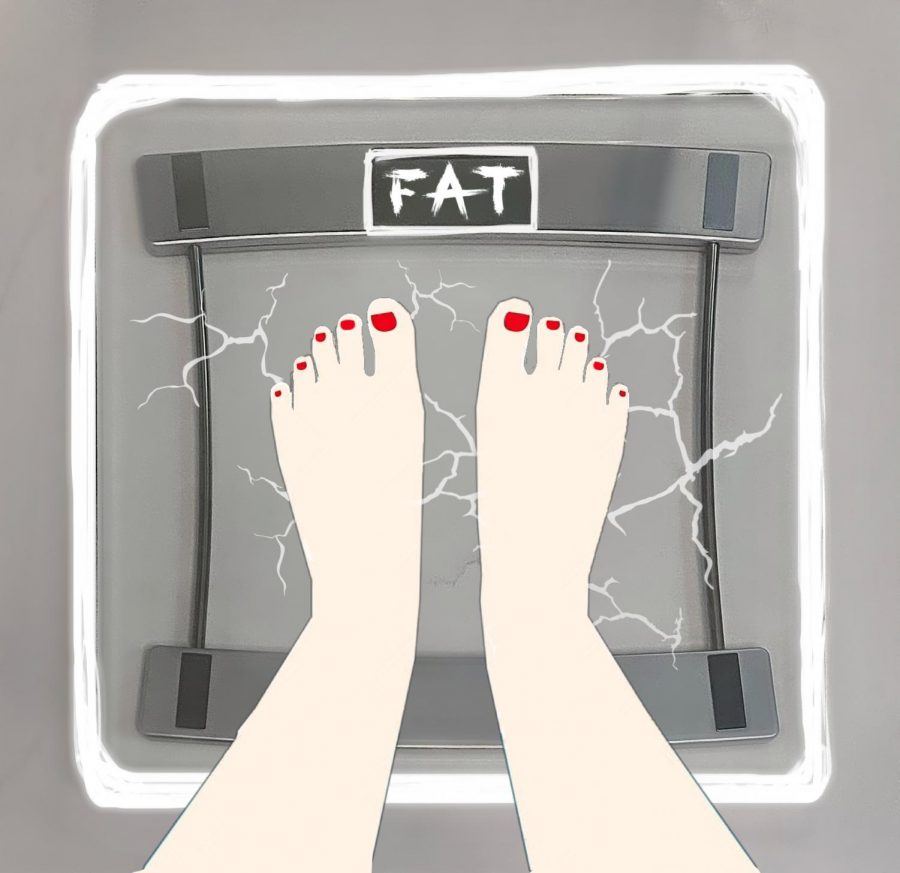How do we learn to love ourselves?
Promoting positive self-talk to young people struggling with body image is more prevalent than ever
Struggling with body insecurities and self-esteem issues are regarded as normal behaviors in young people, but many adults fail to see the severity of the current situation. With the rise of social media, it is hard to feel adequate in one’s own skin, and it is nearly impossible for one person to adhere to our culture’s ever-changing beauty standards. All of these factors paired with staying in isolation for almost a year due to COVID, hating ourselves and our bodies has become the new normal for teenagers in 2021.
Young girls are expected to maintain a slim figure and a perfect complexion. Adolescent girls are taught that the only way to be seen as desirable and likable is to adhere to a specific image of beauty and health. In an attempt to fit said image, girls begin to fixate on every flaw and distort their own image. According to a 2014 study done by Heather R. Gallivan at the Park Nicollet Melrose Center, over 80 percent of 10-year-olds are afraid of being fat, and by middle school, 40-70 percent of girls are dissatisfied with 2 or more parts of their body. On the flip side, young girls that are repeatedly praised for their slim figures and angular features are often oversexualized and are then expected to act a certain way in order to uphold society’s expectation of them as well. There is no winning in a society that values people based solely on their body and/or appearance.
There have been several campaigns by big companies promoting body positivity in women; people are aware of the fact that the majority of young girls deeply struggle with body image and insecurities. Campaigns such as Dove’s “Real Beauty Pledge” encourage young girls to build body confidence and look up to “real women” instead of models. As nice as it is to see diversity in the beauty industry, a marketing campaign targeted towards adult women is not going to actually impact the mental health of adolescent girls growing up in the age of the internet.
Young boys, however, are often left out of the conversation entirely. They don’t even get a feel-good billboard to tell them their body is valid. The beauty standard for men is shifting in a different way; in recent months, the “skinny guy” image has had a surge in popularity (particularly on Tiktok). I myself have seen dozens of comments and videos promoting the “malnourished look.” Boys are being told that looking like they “smoke a pack a day” is attractive and desirable. This evolving beauty standard as well as the existing expectation for boys to be strong, muscular, and masculine has created an impossible idea of what young men should be.
Adults need to be having healthy conversations with young people about mental health and self-esteem because the longer these problems go unaddressed, the more kids develop eating disorders. Eating disorders affect 9 percent of the population and are incredibly dangerous regardless of gender. According to the National Association of Anorexia Nervosa and Associated Disorders (ANAD), “eating disorders are among the deadliest mental illnesses, second only to opioid overdose.” Although eating disorders are more commonly diagnosed in girls, boys make up 25 percent of individuals with anorexia nervosa, and they are at a higher risk of dying because they are often diagnosed later in life.
After laying out all the ways self-esteem issues can harm us, the only question left to ask is how do we learn to actually love ourselves? Is it possible to find comfort in our bodies and reject the expectations others hold us to? Short answer, yes. But developing a healthy relationship with food and your body is not an overnight transformation. Blocking out negative self-talk is extremely difficult, and oftentimes not something an individual can achieve alone. Reaching out for help from family, friends, or a licensed therapist are all great ways to combat repetitive negative thoughts. However, this is not always an option for everyone; learning to find comfort in yourself is just as admirable and impressive as reaching out to others.
Encouraging positive self-talk and teaching young people to respect their bodies is a vital step towards universal body positivity. We all have some extra alone time with our thoughts because of quarantine, and that can be very scary, but in order to move past harmful behaviors and thought patterns, we need to first identify those behaviors and thoughts.
If social media is causing a lot of harmful thoughts, taking a break from certain apps is a great way to take care of your mental health. It’s natural to compare ourselves to those we see around us, and because of social media apps such as Tiktok and Instagram, we begin to hold ourselves to unachievable standards. Recognizing these obstacles and making proactive choices that benefit your mental health may prevent a lot of hurt in the future. Deleting apps, distancing yourself from people that make you feel bad about yourself, and even taking deep breaths or meditating are all great ways to prioritize your mental health and build up self-esteem when things are hard. It takes so much energy to constantly hate ourselves, and everyone should make an effort to let go of that mental burden.
In a study about body image, the UK Mental Health Foundation concluded that we can all be more aware of the ways in which we speak about our own and other people’s bodies in our daily lives. Even casual conversations with friends and family. Learning to love our bodies as they are starts with practicing and promoting positive self-talk. There are no shortcuts when it comes to matters of the heart and mind, but there is a light at the end of the tunnel. That light is attainable, and you are worthy of basking in it.



